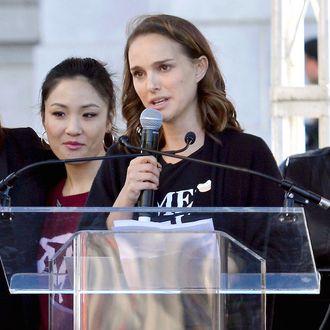
While speaking at the Women’s March in downtown Los Angeles on Saturday, actress Natalie Portman described her experience of “sexual terrorism” after the release of her first film, Léon: The Professional. Portman was 13 when the film came out and remembered being excited to open her first fan mail, only to find a “rape fantasy” written by a man. She recalled a local radio station starting a countdown to her 18th birthday, when she would be “legal,” and how critics commented on her “budding breasts” in reviews. At 13, she quickly learned that she would feel unsafe if she expressed herself sexually and built a reputation as “being prudish, conservative, nerdy, serious” to feel safe, rejecting roles that even had kissing scenes.
“I felt the need to cover my body and to inhibit my expression and my work in order to send my own message to the world: That I’m someone worthy of safety and respect,” said Portman, while wearing a Time’s Up T-shirt. “The response to my expression from small comments about my body to more threatening deliberate statements served to control my behavior through an environment of sexual terrorism.”
Below is the transcribed speech, via CNN.
Let me tell you about my own experience. I turned 12 on the set of my first film, The Professional, in which I played a young girl who befriends a hitman and hopes to avenge the murder of her family. The character is simultaneously discovering and developing her womanhood, her voice, and her desire. At that moment in my life, I too was discovering my own womanhood, my own desire, and my own voice. I was so excited at 13 when the film was released and my work and my art would have a human response. I excitedly opened my first fan mail to read a rape fantasy that a man had written me. A countdown was started on my local radio show to my 18th birthday, euphemistically the date that I would be legal to sleep with. Movie reviewers talked about my budding breasts in reviews.
I understood very quickly, even as a 13-year-old, that if I were to express myself sexually, I would feel unsafe. And that men would feel entitled to discuss and objectify my body to my great discomfort. So I quickly adjusted my behavior. I rejected any role that even had a kissing scene and talked about that choice deliberately in interviews. I emphasized how bookish I was and how serious I was. And I cultivated an elegant way of dressing. I built a reputation for basically being prudish, conservative, nerdy, serious, in an attempt to feel that my body was safe and that my voice would be listened to.
At 13 years old, the message from our culture was clear to me. I felt the need to cover my body and to inhibit my expression and my work in order to send my own message to the world: That I’m someone worthy of safety and respect. The response to my expression from small comments about my body to more threatening deliberate statements served to control my behavior through an environment of sexual terrorism.

